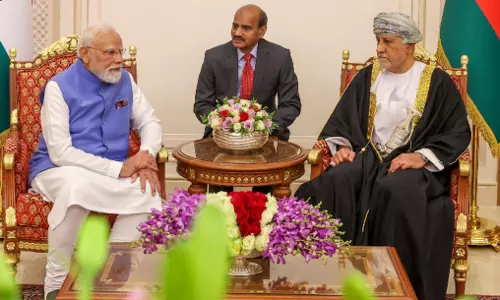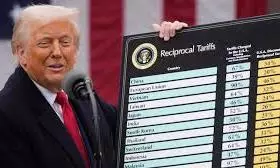
India faces tariff setback, US grants trade advantage to Pakistan and Bangladesh
text_fieldsIn a move that could severely impact Indian exports, the United States has announced lower import tariffs for more than 50 countries, including key Indian competitors such as Pakistan, Bangladesh, and several Southeast Asian nations.
The newly announced tariffs, which are set to come into effect on August 7, will impose a 25% rate on Indian goods — significantly higher than those levied on other nations.
While Pakistan, with which the US has recently announced a trade agreement, will face a 19% tariff, Bangladesh — a major rival in the global readymade garments (RMG) sector — will be subject to a 20% duty even without a formal trade pact.
These revised rates are likely to undermine India’s position in the American market, especially in labour-intensive sectors such as textiles, electronics, and footwear.
The notification comes amid stalled negotiations between India and the US over critical sectors like agriculture and automobiles.
A source familiar with the matter said the preferential tariff structure for countries such as Vietnam (20%), Malaysia, Indonesia, and the Philippines (19% each) could also weaken India’s competitiveness in high-value segments like electronics and non-leather footwear manufacturing.
A White House official acknowledged the trade impasse, stating that President Donald Trump is dissatisfied with the pace of talks with India. "I think President Trump is frustrated with the progress we’ve made with India but feels that a 25 per cent tariff will address and remedy the situation in a way that’s good for the American people," said White House economic adviser Kevin Hassett.
The US notification also hinted that some countries with which trade and security agreements are either in place or nearing conclusion will continue to face these new tariffs "until these agreements are finalised and subsequent orders are issued."
One of the key stumbling blocks in the India-US trade deal has been Washington’s push for greater access to Indian markets for genetically modified (GM) agricultural products such as corn and soya — a proposal India has resisted. New Delhi is unlikely to concede to these demands, given its cautious regulatory approach and domestic political sensitivities.
The US Trade Representative (USTR) has previously criticised India’s biotech policies, stating: “India’s biotechnology approval processes are slow, opaque, and subject to political influences, and do not appear to take into account science-based approval processes for GE products in exporting countries.”
The report also highlighted that as of December 31, 2024, the Food Safety and Standards Authority of India (FSSAI) had yet to finalise regulations on genetically engineered food products.
While India continues to seek improved access to the American market for its textiles, leather goods, and footwear, the US remains focused on dismantling India’s regulatory barriers to agricultural and dairy imports. However, with a majority of Indian farmers working on small-scale land holdings and lacking high-tech support, liberalising this sector remains a politically sensitive issue in India.
As the tariff deadline approaches, Indian exporters may find themselves at a significant disadvantage unless the trade dialogue sees a breakthrough.


















